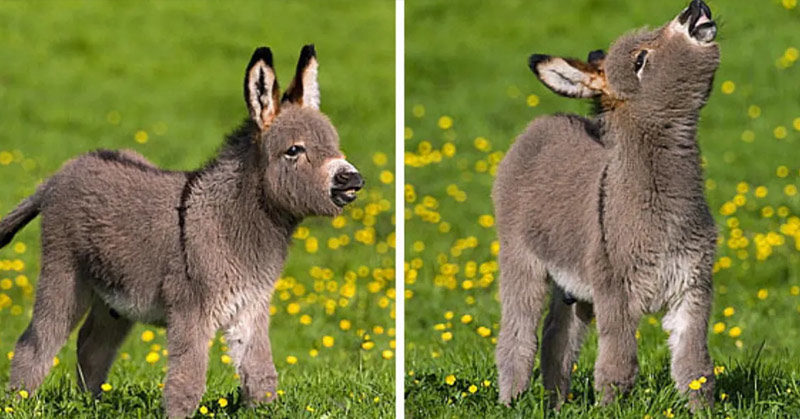My friend and I have a system. Since we live on different continents, when one of us in a bad mood, we bomb each other’s phones with pictures of cute animals, like bunnies in teacups, snuggling kittens, and puppies as puffy as cotton balls. That’s a short list too as there are so many cute animals in the world that are often overlooked. I mean, have you ever looked up baby seals or meerkats? Well, here’s a new adorable creature to ‘aww’ over: miniature donkeys.
What are Miniature Donkeys?
Miniature donkeys come from the breed of Mediterranean donkeys that are smaller than the average sized donkey. Officially, miniatures are no more than 36 inches tall and weight somewhere between 200–400 pounds. For comparison, standard donkeys are about 36–48 inches tall and weigh about 400–500 pounds. A mini donkey can literally be half of its size.
In appearance, they could come in a wide range of colors from grey to brown to tan to black. There might be light spots on their fur as well. Overall, they look almost exactly the same as standard donkeys, aside from their size. Their build consists of strong legs, thick chests, and hooves that are angled in slightly different directions to help them evenly distribute the weight of heavy loads. This method of hoofing is called “cow-hocking.”
Miniature donkeys originated from the islands off of Italy, Sicily, and Sardinia. They were used for carrying wood, parcel deliveries, and helping with the livestock. In the 1920s, they were exported to the United States, and that’s when they became really popular. They were sold for farm labor but they were also sent into fairs and horse shows. Today, not many remain in Europe; they are mostly bred in North America. [1]
Can You Get Miniature Donkeys as Pets?
The answer is yes!
Miniature donkeys, also called dwarf donkeys, can make great pets. They are domesticated, friendly, loyal, and will form bonds with their owners like a dog or cat. Owners state that their pet mini donkeys are sweet, playful, gentle, and can be trained. Also, their fur is so soft!
The National Miniature Donkey Association (NMDA) encourages people working with those who are elderly, sick, or handicapped to bring in dwarf donkeys. Their patients are sure to enjoy an affectionate nuzzle or hug from these adorable animals. [2]
If You’re Interested in Buying a Miniature Donkey as a Pet, Here’s What You Need to Know
Commitment
As with any pet, you need to ensure you are fully on board with investing the time and cost required for the animal’s well-being. This includes training, food, shelter, and veterinary care. The latter could include deworming every three months, trimming hooves every 3–4 months, and routine care. Mini donkeys can live for about 25–30 years, so this is a long-term commitment. [3]
According to John N. Stallone, a professor at the Texas A&M College of Veterinary Medicine & Biomedical Sciences, owners should devote at least one hour per day to the animal.
“This hour includes feeding twice a day and any grooming you might want to do, such as brushing their coat or cleaning feet,” Stallone said. “Most donkeys love human attention, so you would need more time if you take your donkey for a walk or do other activities, such as training to do obstacle courses or pulling a cart. Donkeys are very intelligent and learn quickly, whether it is a new trick or a bad habit.”
Open Space
Mini donkeys should have full access to open, grassy spaces — their natural habitat. This where they’d like to spend their time, although they won’t protest to staying a in a stable while it rains or on a particularly cold night. They are not good indoor-only pets.
Stallone recommends a three-sided shelter they could rest in. “Miniature donkeys should have some pasture to graze on, as the grass intake will help to promote good intestinal motility and to prevent constipation or colic,” he said.
Diet
They like to eat grass and grains, as their teeth are large and flat, fit for chewing plants but not meat. Mini donkeys love treats (as do we all). They’ll eat apples, carrots, oranges, beets, turnips, pears, and even whole bananas with the peels still on. They also like molasses but that should be kept as an occasional treat because of the high sugar content.
“It’s fun to give them treats to promote friendliness and help with training, but avoid excessive treats because some donkeys will start to nip at fingers,” Stallone said. “A loud ‘No!’ will often stop this, as well as quickly pushing their muzzle away from you with your open hand. Avoid slapping or hitting the donkey on the head or face, as this will just cause the donkey to become ‘head shy’ and fear your hands.” [4]
Rides and Outfits
The weight limit on dwarf donkeys is about 50–100 pounds so kids and pets could ride them, but adults should not. What’s cuter is that these donkeys are very tolerant of wearing silly costumes and cute sweaters. Little donkey outfits are a hit at fairs, horse shows, and other public events.
Stubbornness
Be warned however. These sweet and gentle animals can be very headstrong and stubborn when they want to be. There’s not much you could do when a 300-pound creature is digging its calves into the earth.
Price
If you’re interested in buying a miniature donkey, keep in mind that they can cost from $500–$2,000, depending on their age, gender, size, and whether or not they had been registered with the ADMS or IMDR as an official mini donkey.
[1] “27 Cute Miniature Donkey Facts (Photos, History, Size, Cost, Pets).” Dena Haines. Storyteller Travel. August 13, 2020
[2] The National Miniature Donkey Association. NMDA.
[3] “How to Keep a Donkey as a Pet.” Valerie A. Modreski. Mom.com. September 26, 2017
[4] “Miniature Donkeys as Pets.” Texas A&M College of Veterinary Medicine & Biomedical Sciences. VetMed. April 13, 2018

